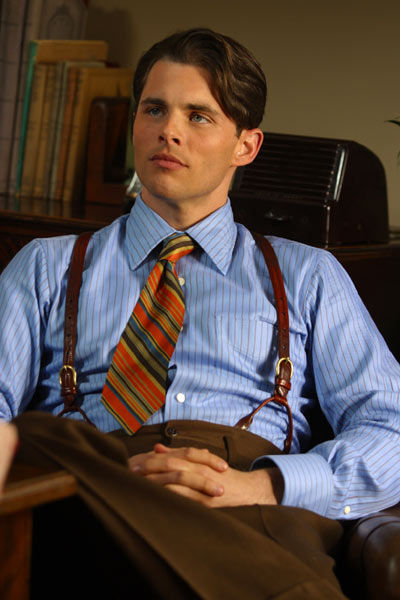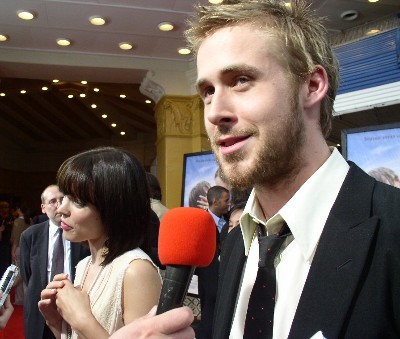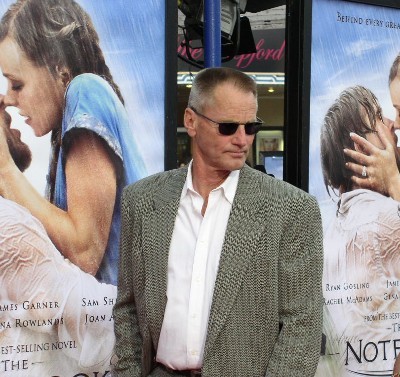| Home | Ryan Gosling | Plot & Setting | Cast & Crew | Rachel McAdams | Reviews | Quotes | Soundtrack | Book |

 |
 |
 |
 |
| Roger Ebert of the Chicago Sun-Times |
|
"The Notebook" cuts between the same couple at two seasons in their lives. We see them in the urgency of young romance, and then we see them as old people, she disappearing into the shadows of Alzheimer's, he steadfast in his love. It is his custom every day to read to her from a notebook that tells the story of how they met and fell in love and faced obstacles to their happiness. Sometimes, he says, if only for a few minutes, the clouds part and she is able to remember who he is and who the story is about. We all wish Alzheimer's could permit such moments. For a time, in the earlier stages of the disease, it does. But when the curtain comes down, there is never another act and the play is over. "The Notebook" is a sentimental fantasy, but such fantasies are not harmful; we tell ourselves stories every day, to make life more bearable. The reason we cried during "Terms of Endearment" was not because the mother was dying, but because she was given the opportunity for a dignified and lucid parting with her children. In life it is more likely to be pain, drugs, regret and despair. The lovers are named Allie Nelson and Noah Calhoun, known as Duke. As old people they're played by Gena Rowlands and James Garner. As young people, by Rachel McAdams and Ryan Gosling. The performances are suited to the material, respecting the passion at the beginning and the sentiment at the end, but not pushing too hard; there is even a time when young Noah tells Allie, "I don't see how it's gonna work," and means it, and a time when Allie gets engaged to another man. She's a rich kid, summering at the family's mansion in North Carolina. He's a local kid who works at the sawmill but is smart and poetic. Her parents are snobs. His father (Sam Shepard) is centered and supportive. Noah loves her the moment he sees her, and actually hangs by his hands from a bar on a Ferris wheel until she agrees to go out with him. Her parents are direct: "He's trash. He's not for you." One day her mother (Joan Allen) shows her a local working man, who looks hard-used by life, and tells Allie that 25 years ago she was in love with him. Allie thinks her parents do not love each other, but her mother insists they do; still, Allen is such a precise actress that she is able to introduce the quietest note of regret into the scene. The movie is based on a novel by Nicholas Sparks, whose books inspired "Message in a Bottle" (1999), unloved by me, and "A Walk to Remember" (2002), which was so sweet and positive it persuaded me (as did Mandy Moore as its star). Now here is a story that could have been a tearjerker, but -- no, wait, it is a tearjerker, it's just that it's a good one. The director is Nick Cassavetes, son of Gena Rowlands and John Cassavetes, and perhaps his instinctive feeling for his mother helped him find the way past soap opera in the direction of truth. Ryan Gosling has already been identified as one of the best actors of his generation, although usually in more hard-edged material. Rachel McAdams, who just a few months ago was the bitchy high school queen in "Mean Girls," here shows such beauty and clarity that we realize once again how actors are blessed by good material. As for Gena Rowlands and James Garner: They are completely at ease in their roles, never striving for effect, never wanting us to be sure we get the message. Garner is an actor so confident and sure that he makes the difficult look easy, and loses credit for his skill. Consider how simply and sincerely he tells their children: "Look, guys, that's my sweetheart in there." Rowlands, best-known for high-strung, even manic characters, especially in films by her late husband, here finds a quiet vulnerability that is luminous. The photography by Robert Fraisse is striking in its rich, saturated effects, from sea birds at sunset to a dilapidated mansion by candlelight to the texture of Southern summer streets. It makes the story seem more idealized; certainly the retirement home at the end seems more of heaven than of earth. And the old mansion is underlined, too, first in its decay and then in its rebirth; young Noah is convinced that if he makes good on his promise to rebuild it for Allie, she will come to live in it with him, and paint in the studio he has made for her. ("Noah had gone a little mad," the notebook says.) That she is engaged to marry another shakes him but doesn't discourage him. We have recently read much about Alzheimer's because of the death of Ronald Reagan. His daughter Patti Davis reported that just before he died, the former president opened his eyes and gazed steadily into those of Nancy, and there was no doubt that he recognized her. Well, it's nice to think so. Nice to believe the window can open once more before closing forever. |
| Manohla Dargis of the Los Angeles Times |
|
The prose in Nicholas Sparks' romantic potboiler "The Notebook" isn't simply purple — it's a violent purple, as blue-black and slobbery as a chow's tongue. A triumph of kitsch emotion and easy-does-it style, the book vaulted up bestseller lists on its publication in 1996, all but assuring a movie adaptation. The rights were sold to Hollywood and for years directors such as Steven Spielberg and Jim Sheridan toyed with the property, before Nick Cassavetes summoned the courage to go where few filmmakers of taste dare to go — the three-hankie weepie. Ladies and gentlemen, start your sobbing. Divided between the gauzy past and a somewhat flintier present, the story spans six decades of love between an Emersonian type named Noah Calhoun and a wealthy Southern belle, Allie Nelson. Played in the film by Ryan Gosling and Rachel Mc-Adams in flashback, and more movingly by James Garner and Gena Rowlands in the present, the pair first meet while she's on summer break. A flurry of quick-sketch scenes and puppy-love nuzzling ensue, along with a load of hooey, some awkward filmmaking and two unpersuasive lead performances. McAdams, last seen in "Mean Girls," and Gosling, a talented young actor who ripped the screen to shreds in "The Believer," look good in period skivvies, but their passion is too bridled, their actions too well-behaved. They never blow hot life into their characters. Trouble with a capital "T" arrives in the form of Allie's parents (played by Joan Allen and, in a waxed mustache, David Thornton), who deem Noah unsuited to the task of cultivating their hothouse flower. The lovers part, tears fall and time marches inexorably on, though Cassavetes does pause, rather inexplicably, for a World War II interlude with exploding bombs and bodies. Years later, Noah has sprouted a beard and Allie has snared a prospect (James Marsden). Haunted by what might have been, Allie visits Noah for what she believes will be one final time. Too many beers and one thunderstorm suggest otherwise, leading to the story's big mystery. If you don't know what happens next you've either never seen a Hollywood movie or dipped into a paperback filled with throbbing passion and endless love. Adapted by Jan Sardi and written by Jeremy Leven, the film turns out to be a modest improvement on the novel. In place of Sparks' barely there sense of place and psychology, and wall-to-wall platitudes ("He'd learned to enjoy simple things," he writes of Noah), the filmmakers attempt to fashion a backdrop with a little actual bite. The results are generally toothless — the film's honeyed vision of race borders on the obscene — but there's a real attempt to place the characters in context, a material world rather than a greeting-card tableau. Cassavetes isn't much of a director and he never settles on a mood, which he seems intent on ruining with hiccups of goofiness. But there's an underlying humanity to his scenes, a sense that movies are made by people for other people. That's never truer than in the final scenes with Garner and Rowlands. By then the messiness of the past has been neatly resolved and the story's minimal mystery finally revealed. Alone in a sick room with Allie, Noah — now rheumy-eyed and stooped, his hands trembling and face opened wide with wonder — pours out his heart. It's a breathtaking image of a man clutching at what gave his life meaning and completely heartbreaking, although perhaps not for the reasons the filmmakers intended. An unsettling consequence of growing up with the movies is watching beloved stars decline, seeing these heavenly bodies fade. One of the promises old movies make us is that its stars will remain untouched by age, impervious to the passing of time — it's a promise that new movies like this must inevitably break. |
| Stephen Holden from the New York Times |
|
Young love -- the old-fashioned kind that flourished before the age of the hook-up -- has always been one of the most challenging emotions to portray on the screen with any specificity. Beyond the smooches, sighs, and adoring glances, how do you convey the reality of a shared, private paradise?
In the strongest scenes of ''The Notebook,'' the screen adaptation of Nicholas Sparks's treacly best seller, Ryan Gosling and Rachel McAdams break through the barrier to evoke high-strung, slightly crazed teenagers plunging headlong into first love. It is passion that begins in playfulness. Their performances are so spontaneous and combustible that you quickly identify with the reckless sweethearts, who embody an innocence that has all but vanished from American teenage life. And against your better judgment, you root for the pair to beat the odds against them. The romantic drama, directed by Nick Cassavetes from a screenplay by Jeremy Leven and adapted by Jan Sardi from the novel, opens today nationwide. It is told in flashback as Duke (James Garner), a garrulous, ailing old codger in a comfortable nursing home, reads aloud excerpts of a love story to Allie Calhoun (Gena Rowlands), a patient suffering from Alzheimer's. She is so smitten with the 1940's tale of Noah (Mr. Gosling), a poor Southern boy who works in a lumberyard, and his wealthy girlfriend, also named Allie (Ms. McAdams), that for brief intervals his readings jog her blurred memory into focus. As the movie seesaws between Seabrook, N.C., in the summer of 1940, when Noah and Allie meet at a fairground, and the present, it is deliberately (and annoyingly) coy as to who these oldsters might be. Gosh, could they be the same young lovers six decades later? Mr. Garner and Ms. Rowlands are wonderful actors, but Mr. Garner, in particular, plays ''old'' with a hammy avuncularity that sugarcoats his character with a glaze of nostalgia. His performance reinforces the impression that in Hollywood, old age is even more difficult to depict with real honesty than young love. Ms. Rowlands's Allie is quieter and sadder, but she looks too well-preserved for a woman in her condition, and as the story leaps back and forth, the movie veers between unbleached sugar and artificial sweetener. When Noah meets Allie, he is so desperate to impress her that he hangs on the rungs of a Ferris wheel and threatens to jump if she won't go out with him. Even at the beginning, Mr. Gosling's performance emphasizes Noah's slightly creepy streak of fanaticism. After the lovers have separated, he withdraws into himself, grows a beard, and with a small inheritance from his poetry-loving father (Sam Shepard), a Walt Whitman fan, he converts the rotting old mansion he once dreamed of sharing with Allie into the showplace he promised to build for her. He also serves in World War II, where he sees his best friend die in the Battle of the Bulge. Ms. McAdams, who played the alpha queen in ''Mean Girls,'' matches Mr. Gosling's Noah in idiosyncratic verve. Impulsive, giggly and combative, she exudes the air of a careless rich girl bursting out of a bubble, until the moment her stern, watchful mother, Anne (Joan Allen), puts her foot down and ends the relationship. The scenes between the young lovers confronting adult authority have the same seething tension and lurking hysteria that the young Warren Beatty and Natalie Wood brought more than 40 years ago to their roles in ''Splendor in the Grass.'' The power of Ms. Allen's performance comes out of understatement. Impeccably coiffed and outfitted, barely moving her tight lips, she projects the full emotional depth of composure under siege. Like most movies that span many decades, chapters of ''The Notebook'' seem scrunched together. The war, in particular, passes in a flash. It is as a nurse's aide that Allie meets Lon (James Marsden), a dashing, seriously injured soldier from a wealthy Southern family. Once recovered, he courts Allie aggressively and, just when the beautiful couple are on the verge of marrying and becoming the toast of Charleston society, she reads a newspaper article about Noah's architectural restoration and promptly faints. A reunion is in order. For a movie that might have plunged full-scale into bathos, ''The Notebook'' tries to remain restrained. The camera caresses the lush Southern landscape of blood-red sunsets and flocks of ducks, and Aaron Zigman's romantic score drizzles only a light coating of syrup over the ice cream. "The Notebook" is a high-toned cinematic greeting card. It insists on true, mystical, eternal love, till death do us part, and won't have it any other way. |
| For more reviews go to. . . |
| http://www.imdb.com/title/tt0332280/externalreviews |